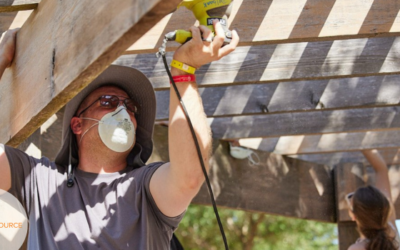Download the Praise Up Bible Study Here.
Introduction
Leader should say something like the following:
November seems like the one time a year when our collective culture says it’s time to be thankful and it feels like no matter where you go (whether it be in person or virtual), you will be reminded of that. You walk into Hobby Lobby, Target, grocery stores, etc. and it seems like every pillow/towel/picture frame says something along the lines of, “thankful heart”. You scroll through Instagram and you see a sea of artsy posts that have a caption along the lines of, “What are you thankful for?” followed by #blessed. This is the season when it seems as if being thankful is a no-brainer.
Thankfulness is so much easier when life is good. Getting out of bed is exciting because you’re ready to start your day. Seeing your friends is everything because you love your community. When life is good, each part of your routine brings joy and contentment. But when life is hard, that’s another story. You dread going to school and you don’t want to do your homework. You see no value in talking with your friends and you may even avoid going to sleep because you know you’ll have to wake up and do it all over again. As much as we wish our life was only good days, the truth is our lives are a constant pendulum between good and hard seasons. But there’s one thing that remains a constant throughout all of life’s seasons: our ability to praise God because no matter what, God is worthy of our praise.
Over the course of our time together, we’re going to dive into a couple of chapters from the book of Psalm that are pretty much emotional opposites: lament and joy. We can all look at our lives and see that it’s much easier to realize all the great things that God has done for us when life is good. Throughout scripture we hear God’s people talk about how our faith is refined in the hardest of times. And that’s so true. While God is never the cause of temptation or suffering, God uses it in powerful ways for His glory. When life is hard, God is showing his goodness and his faithfulness just as much as he usually does…we just have to look for it.
But before we jump into the Word, let’s play a version of Pictionary that revolves all around the things that we’re thankful for.
Opening Game
Praise Up Pictionary
Supplies needed:
- Paper
- Pens
- (If in person) Flip chart or bigger pieces of paper for the students to draw on
We’ve probably all played Pictionary at least once in our lives. Today, we’re playing Pictionary with a twist. During our time together, we’re going to be looking at praising in all circumstances. And since we’re heading into the “thankful” holiday season, you’re going to draw something you’re thankful for.
Let’s break up into two teams and when it’s your turn, you’ll stand up, and have a minute to draw the thing you’re thankful for. If your team can guess it within 60 seconds (or 30 if 60 seems too long), you get a point. The team with the most points at the end wins (if you’re doing this virtually: have kids grab paper in their house and play all together. Have one person drawing and in the chat of whatever you’re using (Zoom, Google Hangout, etc.) people can guess what the thing is)
Opening
Leader should say something like the following:
Think with me for a little bit. When good things happen, what do we do with our arms? They don’t stay in our pockets, they don’t stay at our sides. Instead, they tend to shoot up. When you’re watching your favorite team score all the points, when you’re at a concert and the band starts playing your favorite song, when exciting things happen, our arms tend to go up in the air. What if that’s how we reacted with our praises? That in all of life’s seasons, we threw our praise up just as easily as we throw our arms up when exciting things happen?
We’re heading into a season of life where being thankful isn’t only wanted but expected. But instead of this only happening during the months of November/December, what if this was our mindset year-round? That, no matter what, we “praised up” with our eyes closed? Think about how that could change our life and how we viewed every situation:
- We walk through the Hard praising, knowing that our God sits with us.
- We walk through the Good praising, knowing that our God rejoices with us.
- We walk through the Mundane praising, knowing that our God’s presence is consistent and constant.
This idea of praising in all of life’s seasons gives us the opportunity to change how we approach everything…from our relationships to our jobs. However, this mindset isn’t something that happens overnight. This is something that we should be intentional about. It’s something that we may need guidance on. Today, we’re going to be diving into two different Psalms…one on lament and one on praise. Even though these psalms start out very different, they still point to this truth: that our God is for us. And because He’s for us, we can forever and always praise.
Bible Exploration
Leader should say something like the following:
The Psalms are generally the go-to place for Bible passages on praise. There’s 150 chapters mostly based around how and why God should be praised. At first glance, we often think that the book of Psalms is filled with praises to God when life is easy. But one of the incredible things about the Psalms is that they are the perfect example of how to praise God in all circumstances.
Author side note: the story of David is an incredible story to follow to see how God works and how he can work through anyone/anything. David sent a man to the front lines so he would be killed in order to cover up adultery and yet, David was still known as a “man after God’s own heart”. Incredible.
Let’s jump in. We’re going to look at two different types of Psalms that end in the same way: praising God.
First up, Psalm 13. It’s important to note that Psalm 13 is a psalm of lament. Lament is an expression of emotion that is reserved for feelings deeper than sadness and deeper than mourning. Lamenting is pretty much as bad as it gets. So clearly this is where praise would happen, right? Well, the cool thing about psalms of lament is that usually, they turn around and go from incredible sadness to praise. Let’s read Psalm 13 together and answer these questions:
- Read Psalm 13.
- How can you tell where it turns around into praise?
- Why does David rejoice?
- What does this Psalm teach us about praising when life is hard?
One of the most important things David teaches us is how to be real with God. We’ve somehow gotten it into our heads that God only wants us when we have our act together. But what David teaches us time and time again is that God sees us… our brokenness and our sin and yet, He loves us and forgives us all the same. Each new season and each new day are another opportunity to praise God. Even in the darkest times, when all hope seems lost, our God sits with us and reminds us that we are rescued by His grace and His love.
Now let’s jump over to Psalm 146 for another example of praise. Almost everything feels different about this Psalm…the tone feels lighter, the wording is consistently more joy-filled. This Psalm embodies what it feels like to praise when life is good…when life is where we wish it would always be. Let’s read this psalm together and answer these questions:
- Read Psalm 146.
- What word or phrase sticks out to you and why?
- What does this Psalm say about God?
- Based off this psalm and looking at praise through the lens of our salvation and forgiveness given to us through Jesus, when and why should we praise?
Follow-up discussion
Leader should say something like the following:
Break up into small groups or pairs and discuss these questions. Have the students wrap up their time together by praying for each other before coming back for the closing activity.
- What are three things in your life right now that you can praise God for?
- Think of your personality and answer this question honestly. Is it easier to praise God when life is easy or when life is hard? Why?
- It’s easy for us to get to this place where we’re just going through the motions. Name one way this week you can break up your routine and spend time thanking God for all that he’s done for you (some ideas: Set a reminder on your phone to think through things you can praise God for, if you keep a journal, spend some time each week writing down things you can praise God for, leave a note somewhere in your house as a reminder to praise, etc.)
- Share your highs and lows (the best and worst part of the last seven days) and pray together with your small group/pairs.
Closing Activity
Leader should say something like the following:
After the groups wrap up their discussion and pray together, bring them back for one more activity that they can hold onto to remind them to praise (supplies needed: post-it notes and pens)
A few minutes ago, you shared with your group three things that you could praise God for. Everyone is going to get a post-it note and a pen. I want you to write down what you’re thankful for. You can write the things you shared with your group, or anything else…as long as it’s something you’re thankful for. Then take the post-it note and hang it somewhere in your house to remind you to praise up with your eyes closed.
Closing Prayer
Dear God, Thank you for this time together. I pray you will help us to see the opportunities in our day-to-day lives to praise you. When life is hard, remind us to praise. When life is easy, remind us to praise. Help us to see you in everything and thank you for being the God who promises to walk with us and sit with us. In Jesus name we pray, Amen.







0 Comments